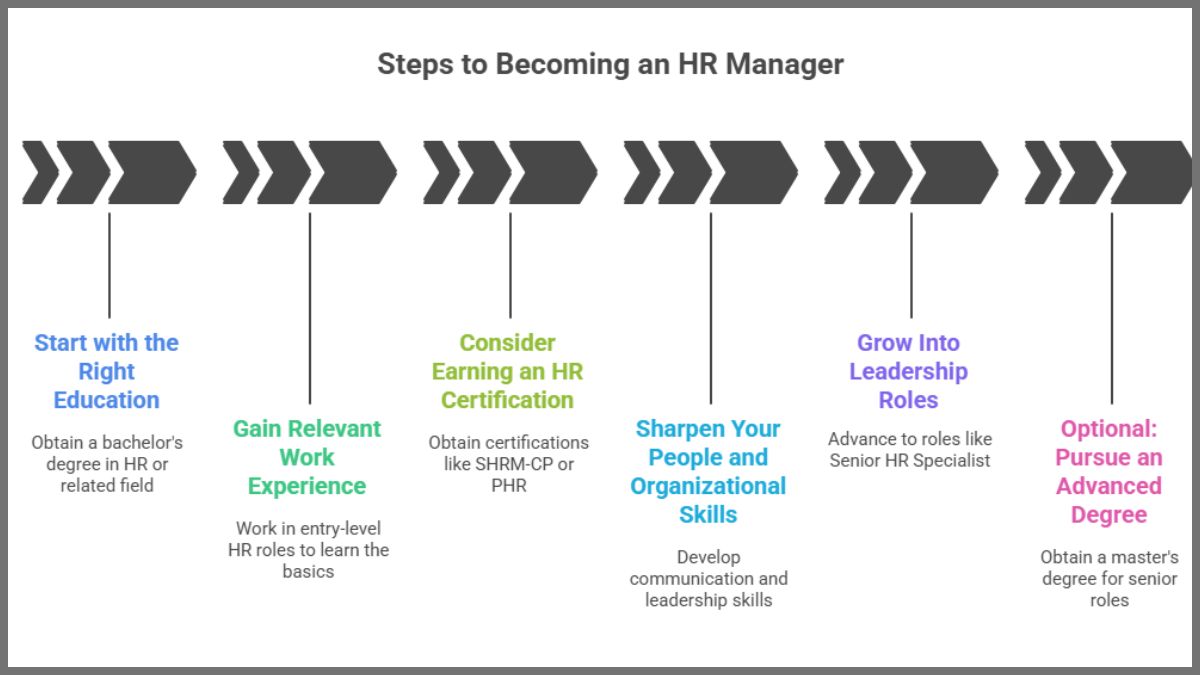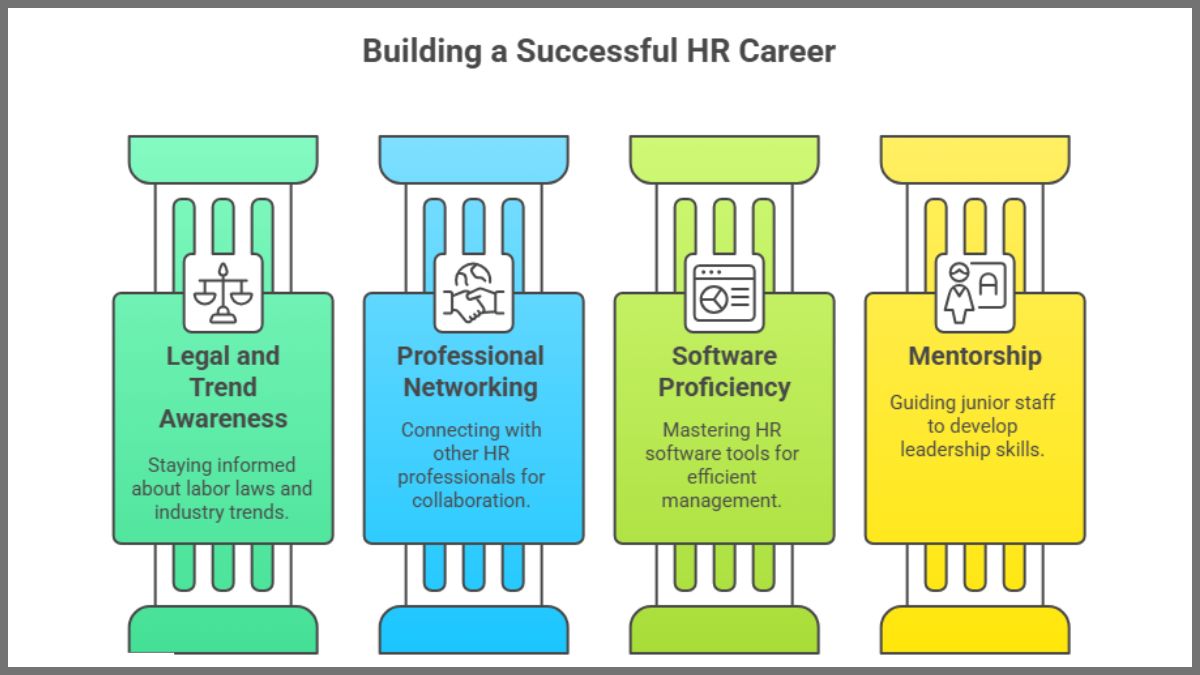Interested in a career that involves working with people, shaping company culture, and keeping workplaces running smoothly? If so, learning how to become an HR Manager could be the perfect path for you. Whether you’re just out of college or considering a career change, it’s never too late to get started. In this guide, we’ll show you the steps to become a Human Resources Manager, the skills you’ll need, and how to grow in this rewarding role.
What Does an HR Manager Actually Do?
Before diving into the steps to become one, let’s look at what HR Managers do on a daily basis. Put simply, HR Managers are the bridge between employees and the organization. They’re responsible for hiring, handling employee issues, setting company policies, and making sure everyone is fairly treated.
Here are some of the main tasks involved:
- Recruiting and hiring new employees
- Training and onboarding
- Managing payroll and benefits
- Employee engagement and satisfaction
- Conflict resolution
- Ensuring labor law compliance
Think of HR Managers as the heart of a company—keeping everything and everyone working in harmony.
Step-by-Step Guide to Becoming an HR Manager
1. Start with the Right Education
Most HR managers begin their journey with a bachelor’s degree in Human Resources, Business Administration, or a related field. This gives you a solid foundation in things like workplace law, organizational behavior, and communication.
If you’re already in college, consider taking courses that touch on labor laws, psychology, or conflict management. These will come in handy later.
2. Gain Relevant Work Experience
Before you can become an HR Manager, you’ll need to spend a few years working in entry-level HR roles. You can also explore roles such as an HR Administrator, which often provide a strong foundation for moving into management. Look for positions like:
- HR Assistant
- Recruitment Coordinator
- Payroll Clerk
- Training Associate
These roles let you understand the nuts and bolts of HR work. You’ll learn how to manage files, screen resumes, onboard new employees, and interpret policies. This hands-on experience is crucial. Think of it like learning to ride a bike before entering a race.
3. Consider Earning an HR Certification
While not always required, HR certifications can boost your resume and show employers you’re serious. Certifications signal you’ve mastered core HR concepts and are keeping up with industry trends.
Some popular certifications include:
- SHRM-CP (Society for Human Resource Management – Certified Professional)
- PHR (Professional in Human Resources)
- SPHR (Senior Professional in Human Resources)
These require some experience in the field and passing a standardized exam. They’re definitely worth looking into as your career progresses.
4. Sharpen Your People and Organizational Skills
Being good at your job as an HR Manager isn’t just about knowing laws or balancing spreadsheets. You also need strong communication and leadership skills.
Here are a few critical skills successful HR Managers often have:
- Empathy – Being able to understand and support employees.
- Problem-solving – Managing workplace conflicts or performance issues.
- Decision-making – Creating fair and practical policies.
- Organization – Keeping up with tasks, deadlines, and employee records.
If you’re someone who enjoys helping people and creating structure, you’re already off to a great start.
5. Grow Into Leadership Roles
Once you’ve built up experience, start looking for roles with more responsibility. Becoming a Senior HR Specialist, HR Generalist, or HR Business Partner is a common next step before you step into the manager role. As you move up, you’ll take on more strategic tasks. Some professionals even branch into areas like HR consulting, helping multiple organizations design effective people strategies.
As you move up, you’ll take on more strategic tasks like managing budgets, leading teams, and helping define company culture. Promotions often come with visible impact—so take initiative, provide value, and build good relationships across departments.
Optional: Pursue an Advanced Degree
While not mandatory, some HR professionals choose to pursue a Master’s in Human Resources Management or an MBA. This can be especially helpful if you’re aiming for senior leadership or executive roles like HR Director or Chief Human Resources Officer.
Advanced degrees can also help you understand the bigger picture—how HR contributes to overall business success.
What’s the Career Outlook and Salary?
Good news—HR Managers are in demand. Almost every industry—from tech and healthcare to retail and manufacturing—needs HR professionals to keep teams running smoothly. According to current job market trends, this profession is expected to grow steadily in the coming years.
As for salary, it varies by company size, industry, and location. But in general, HR Managers earn a substantial income. Entry-level manager roles may start around ₹4–6 lakhs per year, while experienced managers in larger companies can command ₹10 lakhs or more annually.
Tips to Stand Out in Your HR Career
Looking to go above and beyond? Here are a few extra ways to grow as an HR professional:
- Stay updated on labor laws and HR trends – Sign up for industry newsletters or attend webinars.
- Network with other HR professionals – Join HR communities online or at local events.
- Use HR software tools – Familiarize yourself with platforms like SAP, Workday, or Zoho People. You can also explore the best HR software in India to understand what companies commonly use
- Mentor junior HR staff – Teaching others can strengthen your leadership skills.
The more proactive and helpful you are, the more opportunities will come your way. If you’re preparing for your first HR role or a promotion, brushing up on HR interview questions and answers can give you an edge.
Final Thoughts: Is HR Management Right for You?
Still wondering if HR is the right path? Ask yourself a few quick questions:
- Do I enjoy helping others and solving problems at work?
- Am I comfortable balancing company needs with employee well-being?
- Can I handle confidential information with care?
If you answered yes to most of these, you might just have what it takes to become a successful HR Manager.
Remember, everyone’s journey is different. Some people enter HR straight from college, while others shift into the field mid-career. So don’t stress—the important thing is to take one step at a time and keep learning along the way.
Whether you’re starting from scratch or thinking of switching careers, Human Resources can be a rewarding and impactful path. With the right mix of education, experience, and people skills, you can build a meaningful career that truly makes a difference in others’ lives.
So, are you ready to become the go-to person who helps a whole organization thrive? Start today, and your future self will thank you!






